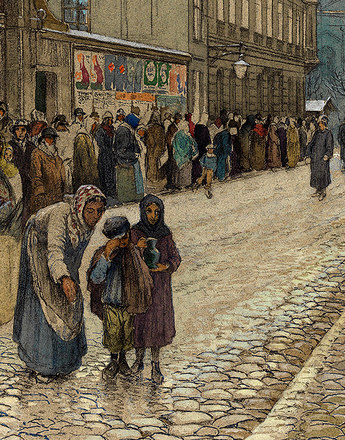Was There an Austrian Revolution or Not?
How are the events before and at the time of the founding of the republic to be assessed? Did an ‘Austrian Revolution’ in fact take place, as Otto Bauer maintained in 1923? Historians have still not been able to agree on the answers.
According to Otto Bauer, a threefold revolutionary process was manifested in the ‘Revolution’ of 1918-19: firstly national revolutions on the territory of the Danube Monarchy gave rise to new states. Ideally in German-Austria this process should have led to union with Germany as a way of saving the entire German population of the monarchy and allowing it to develop on a new and larger scale and territory. This was to be seen as an alternative to the confederation of Austria-Hungary, which was no longer a realistic option.
Secondly, according to Bauer, the revolution had to be given democratic legitimacy. Every nation created its own parliament and its own government. This was linked to a widening of political participation and an extension of the right to vote to women and to the level of provinces and communities.
Thirdly, Bauer claims that the decisive dimension of the ‘Austrian Revolution’ is to be found in the radical social changes. Thanks to the model of ‘industrial democracy’ (such as the introduction of works’ councils and so on) and an intensive social policy the chances for the lives of the broad mass of the population were decisively improved.
What historians like Wolfgang Maderthaner and Ernst Hanisch stress above all in the radical changes of the period 1918-20 is the momentum gained by the political revolution and by the process of creating of a new society of citizens as a result of far-reaching de-feudalization, the extension of the right to participate in political decisions and the development of a parliamentary political system.
Historians explicitly oriented towards the left, for example Hans Hartmann, argue that the theses of Otto Bauer were an expression of the tendency of Social Democracy to use the ‘rhetoric of revolution’. The radical changes in the late autumn of 1918 may have brought about a transformation in the opportunities given to the population to participate in politics as well as far-reaching measures in the field of social legislation which benefited the socially disadvantaged, but the civil service, the judiciary and the police were still essentially dominated by Imperial and Royal bureaucrats. ‘All that changed were the official coats of arms and the portraits of the head of state in the bureaucrats’ offices.’ In the economic system in particular there was no revolution, since the policy of the Social Democrats prevented any form of profound change in the capitalist system by keeping the radical soviet movement tightly under their control.
Translation: Leigh Bailey
Bauer, Otto: Die Österreichische Revolution, Wien 1923
Hanisch, Ernst: Der große Illusionist Otto Bauer (1891–1938), Wien/Köln/Weimar 2011
Hautmann, Hans: Der November 1918 – eine Revolution?, in: Ackerl, Isabella/Neck, Rudolf (Hrsg.): Österreich November 1918. Die Entstehung der Ersten Republik. Protokoll des Symposiums in Wien am 24. und 25. Oktober 1978, Wien 1978, 159-167
Leidinger, Hannes: „... von vornherein provisorischer Natur“: Rätebewegung und Kommunismus in Österreich 1918–1924, in: Karner, Stefan/Mikoletzky, Lorenz (Hrsg.): Österreich. 90 Jahre Republik. Beitragsband der Ausstellung im Parlament, Innsbruck/Wien/Bozen 2008, 91–99
Maderthaner, Wolfgang: Die eigenartige Größe der Beschränkung. Österreichs Revolution im mitteleuropäischen Spannungsfeld, in: Konrad, Helmut/Maderthaner, Wolfgang: Das Werden der Ersten Republik. ... der Rest ist Österreich, Bd. I, Wien 2008, 187-206
Quotes:
„All that changed were ...": Hautmann: Hautmann, Hans: Der November 1918 – eine Revolution?, in: Ackerl, Isabella/Neck, Rudolf (Hrsg.): Österreich November 1918. Die Entstehung der Ersten Republik. Protokoll des Symposiums in Wien am 24. und 25. Oktober 1978, Wien 1978, 159-167, hier 164 (Translation)
-
Chapters
- The End of Monarchy, the Birth of New States
- 12 November 1918
- The Path to 12 November: ‘If there is no peace then there will be a revolution here’
- ‘We intended the strike to be a great revolutionary demonstration.’ The Social Democrats and the January Strike
- Was There an Austrian Revolution or Not?
- A Marxist on Ballhausplatz – Otto Bauer Takes Over Foreign Policy
- The End of the Dream: the Failure of Bauer’s Foreign Policy




